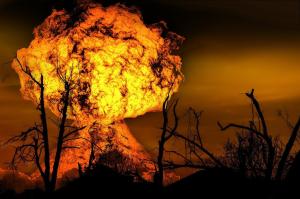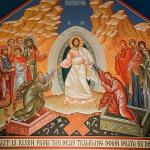
God created the world and saw it was good. As God is the source and foundation of every good, it would be incredulous to think that God would ever seek to have anything which is good to be utterly destroyed. The problem with sin, what makes it evil, is not that sin or evil is a substance, but rather, it seeks to corrupt and destroy that which is good. Indeed, if evil is left unchecked, if it is able to follow its course to the end, it would lead to the annihilation of everything: existence itself would be eliminated. Nothing, not even evil, would be left.
God does not follow the way of sin; God creates, preserves, and restores, God does not destroy. This is why, if we had any question about it, we should be able to conclude God would never destroy creation, or those who inhabit it. At the end of time, therefore, while we are told God will bring about a new creation, as the old one will pass away, we must not understand this so as to suggest God will entirely destroy all of creation to produce a new one ex nihilo, but rather, God will renew creation, transforming it, making it as new:
But it is not satisfactory to say that the universe will be utterly destroyed, and sea and air and sky will be no longer. For the whole world will be deluged with fire from heaven, and burnt for the purpose of purification and renewal; it will not, however, come to complete ruin and corruption. For if it were better for the world not to be than to be, why did God, in making the world, take the worse course? But God did not work in vain, or do that which was worst. God therefore ordered the creation with a view to its existence and continuance, as also the Book of Wisdom confirms, saying, “For God created all things that they might have their being; and the generations of the world were healthful, and there is no poison of destruction in them.” And Paul clearly testifies this, saying, “For the earnest expectation of the creature waits for the manifestation of the sons of God. For the creature was made subject to vanity, not willingly, but by reason of him that subjected the same in hope: because the creature itself also shall be delivered from the bondage of corruption into the glorious liberty of the children of God.”[1]
It often seems we find contradictory statements about creation, as, on the one hand, it is said to be without end, but on the other hand, it is said to have an end. The world is said to be without end because it will always continue to exist; it is said to have an end because there will be a point when time comes to an end, leading to the end of creation’s temporal mode of being. Time has a beginning and an end, and what is in time, will therefore have an end, but that end is itself just the start of something new, a new way of existence, a new modality, as what is in time will be drawn beyond time so that it can participate in eternity, which is why it will also never cease to exist.
It is possible to say evil will come to an end, even to cease to exist, but we must understand this in a conventional sense. Evil is not in and of itself substantial, but rather, it is the corruption of nature and the substances of nature; in this fashion, it cannot be said to exist, but rather, it is what we perceive when what should exist does not. To overcome or even “annihilate” evil is a convention to describe the process by which the corruption and destruction evil has done is overcome and reversed. That is, as evil is not a substance, its “destruction” is not the destruction of something which God established, some good in creation which God seeks to preserve, but rather, the affirmation of the original goodness of creation and the reestablishment of that which evil corrupted or destroyed. God will also take what evil has hurt and make it better than what it was before evil hurt it, which is why it can be said that God will produce good out of evil.
The end of time, therefore, must not be understood as representing an annihilation of creation, but rather, its turning point and change. Time will come to an end when Christ comes again to judge the living and the dead:
We believe that Christ will come at the end of time in the Parousia, the appearance of Christ in glory, to transform this universe by bringing it to its completion in and through himself. But in a real sense, the Parousia is already present in our universe, for persons of deep prayer. For them, through faith, hope and love in Jesus Christ, the master is always coming in his glorified saints and angels. By their union with him, he is now achieving the victory over cosmic evil through all of his members on earth and those living in him in eternal life.[2]
Fr. George Maloney, in the quote above, is right to point out, though there will be an end of time, we can and do find ourselves participating in the eschaton in every moment of our existence, even as all of time will be collected together as one and brought to its universal end when Christ comes back to judge the living and the dead. This is one of many reasons why we can also discuss the eschaton as being “already” and “not yet,” because every moment of time participates in the eschaton because every moment of time has its own particular end, while the fullness of the eschaton to be had and realized when all of time, all of creation, comes together as one to realize its glorification in Christ. Similarly, we can also say that every moment is eschatological because in every moment, we have a chance to encounter the coming kingdom, the eschatological kingdom of God, thanks to the incarnation: Jesus is the Alpha and the Omega, the Beginning and the End, so that in becoming human, being a man, God has brought the eschaton into time (while, as God, keeping the eschaton transcendent as well). Thus, every moment of time mirrors what is to happen at the Parousia; in every moment, God, indeed, the incarnate God-man, is there, and in every moment, we have ways to experience God through the God-man, and thus, the glory of the eschatological kingdom, though to be sure, we do so only in part now, and in full when time comes to an end.
[1] St. Methodius, “From The Discourse On The Resurrection.” Trans. William R. Clark in ANF(6):365-6.
[2] George A. Maloney, SJ, The Everlasting Now (Notre Dame, IN: Ave Maria Press, 1980), 102.
Stay in touch! Like A Little Bit of Nothing on Facebook.
If you liked what you read, please consider sharing it with your friends and family!
N.B.: While I read comments to moderate them, I rarely respond to them. If I don’t respond to your comment directly, don’t assume I am unthankful for it. I appreciate it. But I want readers to feel free to ask questions, and hopefully, dialogue with each other. I have shared what I wanted to say, though some responses will get a brief reply by me, or, if I find it interesting and something I can engage fully, as the foundation for another post. I have had many posts inspired or improved upon thanks to my readers.

















